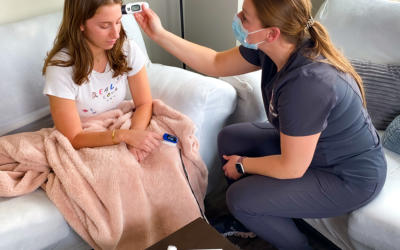Anxiety disorders are the most prevalent behavioral health concern in the United States, affecting around 20% of the adult population.
What are anxiety disorders?
Everyone feels anxious sometimes; anxiety is a normal reaction in many situations. However, if feelings of anxiety are extreme and/or chronic, they can rise to the level of an anxiety disorder.
What does an anxiety disorder feel like?
Anxiety disorders can have many physical symptoms, including:
- Rapid heart rate or breathing
- Trouble focusing on anything other than intense worry
- Difficulty sleeping
- Feeling tense or nervous
- Avoiding certain locations or situations that provoke worry
- Headaches or gastrointestinal symptoms (stomachache, diarrhea)
- Irritability
- Fatigue
- Muscle tightness
What are some strategies to manage anxiety?
- Exercise regularly
- Create healthy sleep habits and get enough sleep
- Practice relaxation techniques like mindfulness meditation
- Learn and practice breathing techniques for anxiety
- Reach out and connect to those in your support system
When do you need medical care for a suspected anxiety disorder?
Reach out to a provider if:
- Your anxiety is interfering with your daily activities
- Your feelings of worry, fear, and anxiety feel out of control
- You are also struggling with feelings of depression or other behavioral health symptoms
- You find yourself relying on alcohol or other substances to reduce your anxiety
- Your anxiety is causing physical symptoms such as headaches or stomachaches
- You think you might harm yourself or others
- If you feel you are a danger to yourself or others, seek emergency care immediately.
Get Help from Pivotal Health
If you’re struggling with anxiety, Pivotal Health can help. Schedule an appointment in the Pivotal Health app or contact our triage support team at 888-688-4746 to arrange for one of our licensed providers to come and speak with you in the privacy and comfort of your own home, on your own schedule. Pivotal Health clinicians are specially trained to assess and diagnose anxiety disorders and other behavioral health conditions. We then can recommend an individual treatment plan that might include a therapist and/or medications, depending on your situation.
All Pivotal Health clinician visits, including those to assess and treat anxiety disorders, include follow-up consultation, leading to a calmer, healthier path forward.












